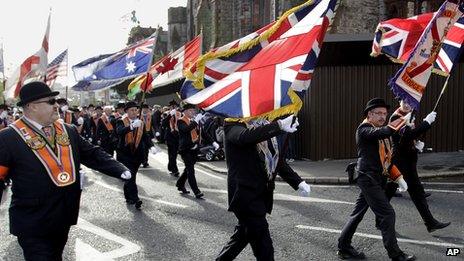Orange Order to get £3.6m grant from European Union peace programme
- Published

The Orange Order has received a grant of almost £4m from the European Union
The Orange Order is getting almost £4m to develop two interpretative centres in Belfast and County Armagh.
Nearly £3m is coming Europe's Peace Three programme with £1m jointly coming from the Dublin government and the Stormont Executive.
The money will be used to expand the Order's headquarters at Schomberg House and Sloan's House, Loughgall.
The extension of Schomberg House will incorporate a museum, including a replica Orange Hall.
Sloan's House, where the first Orange warrants were signed 200 years ago, will include an extension for an extra museum exhibition area.
The Orange Order said Schomberg House would also incorporate a research facility and educational resource, with "access for school and cross-community focused visits".
Its museum is expected to display a variety of artefacts relating to the history of Orangeism around the world.
The Order said five full-time staff would eventually be appointed to work at both sites, which are planned to be operational by the summer of 2014.
The Reach project (Reaching out through Education and Cultural Heritage) received £3.6m from the European Union's Peace III Programme, which is managed by the Special EU Programmes Body.
Grand Master of the Grand Orange Lodge of Ireland, Edward Stevenson, said it was "one of the most significant projects ever undertaken by the institution".
He said: "The aim of this transformational project is to create understanding, education, tolerance and mutual respect through interpretation and creation of shared space.
"The creation of two unique educational and resource centres will tell the story of the foundation of the institution as well as its traditions, development and place in wider society.
"Such world-class developments at both Schomberg House and Sloan's House will also preserve and present the impressive historical collections of the Orange Order in a form that will encourage an informative and engaging learning process."
Pat Colgan, chief executive of the Special EU Programmes Body, said the project would "promote a greater awareness of the history and traditions of the Orange Order".
"By pro-actively reaching out to people, on a cross-community basis, the Order will be able to demystify many of the existing perceptions of what it is," he said.
"This open and honest dialogue will lead to a positive understanding of Orangeism and its place within our society."
The Protestant order celebrates the 1690 Battle of the Boyne victory of William of Orange over Catholic King James II every 12 July.
Its origins date from the 17th century battle for supremacy between Protestantism and Catholicism.
In 1795, a clash between Protestants and Catholics at the Battle of the Diamond led to some of those involved to swear a new oath to uphold the Protestant faith and be loyal to the King and his heirs, giving birth to the Orange Order.
The Order regards itself as defending the civil and religious liberties of Protestants and seeks to uphold the rule and ascendancy of a Protestant monarch in the United Kingdom.